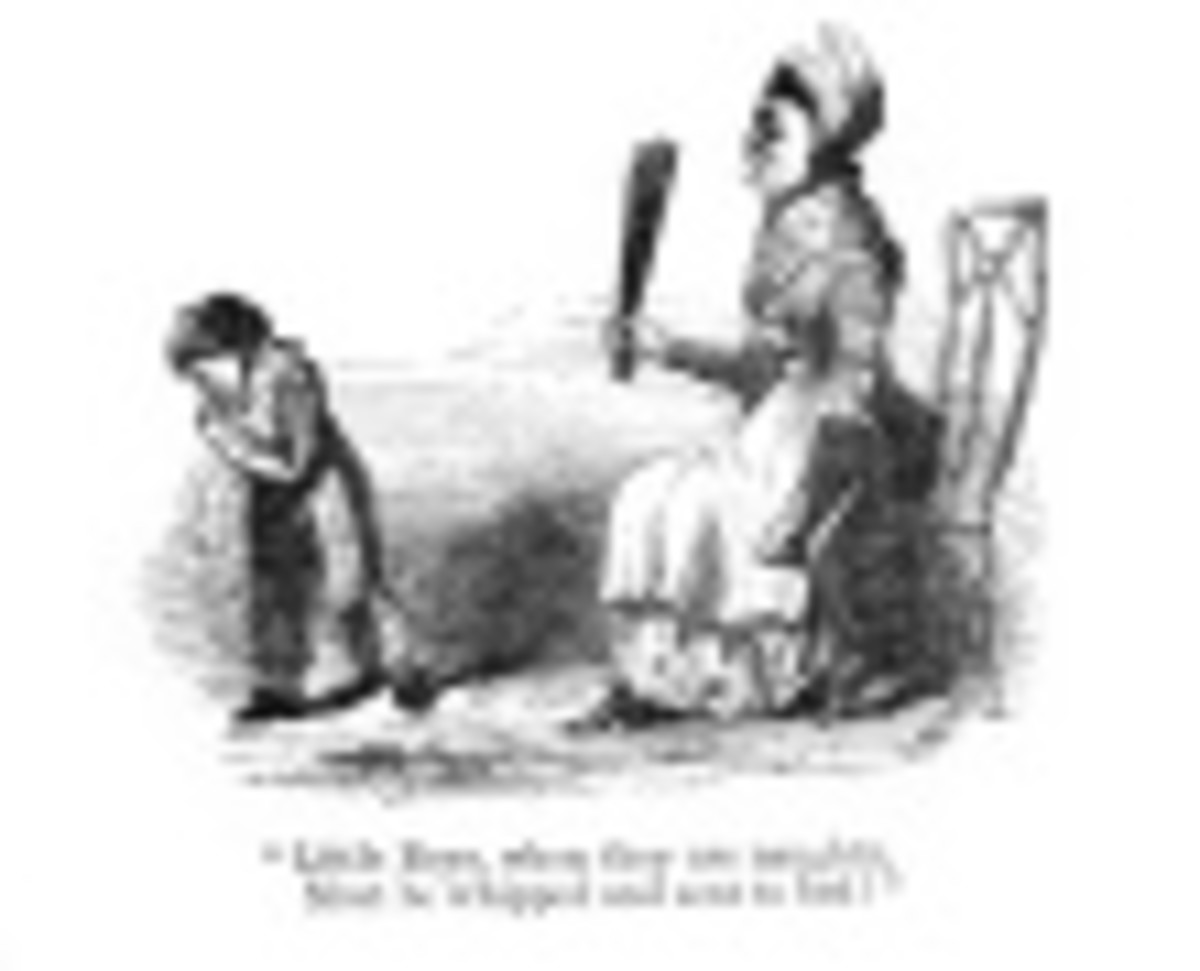- HubPages»
- Books, Literature, and Writing»
- Commercial & Creative Writing»
- Creative Writing
Once and Never Born Son, a Short Story
“Are you sure you want your kid melanin deficient?” Tyler joked. “I thought we were here to make sure the kid didn’t have any defects.”
“I thought you’d let me pick a coloration combination a lot like mine,” I challenged him.
“I do. I just don’t like the skin to be as light as the hair. It’ll look … odd.”
“My ancestry is in that direction.” I couldn’t say more aloud what I thought: hey, remember my blonde grandmother and relatives with blue eyes? Ain’t that rare these days? And that exotic look attracted you to me in the first place? However, he had a point. I caught his eye because I stood out in the crowd like a sore thumb, being so light and fair. I decided to compromise some. “Fine. Tyler, do you want dark brown hair or black hair?”
“Black, like mine. Let the kid look like everybody else.”
“Curly or no?” I’d go with what he wanted here. It made no difference to me either way.
“Straight like yours. It’s easier to maintain. But black.”
“If the hair goes that dark, I want the kid’s skin as light as mine.” I tried to pantomime without being obvious to the clerical / genetics lab person watching us. You couldn’t say anything racist or elitist or sexist in a place like this – the State wouldn’t let you breed. Or let you get one au natural kid, with all the risks that entailed. And you don’t come to a lab like this if you are willing to take those risks.
“And you get a lot of flak for it. No. The kid has to be darker than you. Maybe not as dark as me, but not as pale as you. So it looks like a natural mix.” I raised an eyebrow at the irony of his statement, but he didn’t seem to notice it. Tyler called up the skin tone wheel on his own screen. “How about that shade?” He pointed to a darker beige tone than the cream with a touch of coffee I had selected. “It would look like a natural blend of us both – and still favor you - a little.”
“And they’ll look like every other kid on the street.”
“If they look like you, they’ll stand out like a sore thumb,” Tyler gently ribbed, not quite joking.
“Oh, come on, you were attracted to me because I stood out a little.” He shrugged. “Compromise?” I offered. He shrugged again. As if picking the look our child would have for the rest of its life was of less concern to him that the car we’d gotten a few months ago.
We perused further through the listings. Genetic combinations were a tricky matter, so you had to select a whole constellation of factors at once. We finally picked a dark honey hair and light honey skin combination with green-brown eyes. My coloring, but very little resemblance to me in the face a lot of resemblance to him. And the kid would get full health benefit package; that we totally agreed upon. We paid extra so that the biocompatibility index was tailored to an equal representation of us both; if the kid needed a kidney in 20 years, we’d both want to be compatible donors. Some parents had gone for the old fashioned genetic mixing in the lab except for the usual tweaks to intelligence, athletic ability and healthy appearance in an effort to minimize their guilt of genetic synthesis. Let it be as natural as possible, except for all the little extras. They paid for it when their kids needed organs and no relatives were a match. We weren’t going to make that mistake. We made our selection and signed off on it for the medical review board.
We waited for an hour as the genetics gurus reviewed our selection for acceptability. We were informed that the combination was approved. It took another two hours for bureaucrats somewhere in the world to vote yeah verily, this child shall be allowed to exist in this combination. All that remained was for the final interview and final assignment of gender.
The final interviews with the geneticist were separate and private. The powers that were wanted to make sure all the parents involved were in agreement on the choice to be made. The doctors went along with the rules; anything less that full approval by prospective parents risked a lawsuit if not an unhappy client or even a broken home. And gender, often, was a deal breaker for parents who often agreed between each other but not in front of the interviewer. A random draw sent my husband in first.
The two hours of Tyler’s interview passed by slowly. I wondered how it could take so long. Did he have reservations about having a baby? We’d gotten a two-bedroom apartment with extra living space in preparation for this. Had he decided against our plan, to request a girl first and then ask for a boy? That his patience to let a daughter come first – and guarantee us being a family – overwhelm his desire for a son? If the girl came first, then I knew he’d petition long and hard to be allowed a second child, his long desired son. And then I’d have the two child family I desperately wanted. If he gave in to the hard desire for a child just like him, he might not want a second one. He’d be happy with his one and only perfect son. And I’d have a lonely only child … like so many others. Though no one else understood that thought, when it was so hard to find a place alone anymore.
But the sounds of neighbors and the neighborhood below always infiltrated the walls, however muted. 8 billion people crowded into dense cities could never be as quiet as the rural area I barely remembered before the eco-Nazis forced us to relocate to a “denser” population center. I remembered the grass and trees that belonged to us and only us … and my two older siblings. My older brother, horror of horrors, had died in a war. As a soldier no less. My sister had died in some terrorist act against her school. I didn’t remember either of them directly, though there were plenty of videos and pictures. Little talk of them, though. When we’d relocated, we almost pretended that I was their only child. It was better than the stigma of having been an “extra” child. All that remained of them that I felt any connection to was the lack of connection. The loneliness that hadn’t existed before, even as the relocation dumped us into a building with so many people that the common areas overflowed into the private ones.
My parents had fought the relocation. Their reasoning was sound, if politically incorrect. The birth rate had been below replacement level for 30 years. What was wrong with someone else having a large family or large land, when it was being depopulated? The birth rate decline was partially due to high taxes for wealth redistribution, partially from the high cost of living with so many people fighting for limited living space outside the growing mandated wilderness. And part of it was from social disapproval for kids and “breeders” in general. So much was done in the name of the children that many people grew downright hostile of children. That baby, that’s why I’m not allowed to do X, or Y, or Z! And because of the world THEY have to inherit, I don’t get the world I want today!
We were both intelligent and healthy. We were both in the high technology field, so we could obviously afford a baby. We even had permission to have two children. So many were only allowed one because of their financial lack, or bad genes, or inappropriate social views. Or those who were sterilized due to bad DNA, so that society didn’t bear the burden of their children’s medical costs. Fixing genes was expensive; only those who could afford it did it. We were perfect enough; we were young enough that our parents had at least had genetic screenings, if not actual tweakings done in uteri. If my parents had done such a thing, they’d kept is secret … like many of their generation. Today, it was out in the open. It was almost expected for couples to tweak their genetic combo into perfection. With so few chances for biological immortality, how could you not give your child everything you could, from their very conception?
Tyler came out, shaken and withdrawn. He was almost as pale as I was naturally. Just what kind of interview had he been in? I felt a twinge of fear, knowing that was a bad emotion to have when dealing with the fate of one’s progeny. I was called in for my interview.
The geneticist got down to business.
“I see that you agreed on a daughter.”
“Yes.”
“Many couples still harbor a bias to boys,” the interviewer retorted.
Oh, no. Tyler must have wanted a boy and I said I wanted a girl. “If Tyler wants a son, I’d have one. It doesn’t matter to me.”
“You requested a girl on your form.”
“Yes. Yes, I did. But I want us to be in agreement –“
“You’re not repressed, are you?”
Red warning lights went off in my mind. I pitched my voice as conversationally as possible. “We have permission to have two children. We were thinking of having one of each gender. I don’t care if we have one or the other first. If Tyler wants a boy, I can go with that, too. As long as I get my daughter in, eventually. I’d just like a girl first, to get my parental experience in with the easier to child first.”
The Indian nodded to himself. A lot of parents had their only child as a girl for the supposed convenience and ease of child rearing. I knew that Tyler wanted a boy, but if we had the girl first, we’d be able to argue family balancing later on to give him his dreamed of son. And as the mother, and the hopes of being a grandmother one day, I should have a preference for a girl. Girls almost always had at least one child of their own.
“Due to the continuing global gender imbalance, we’ve had a directive to favor daughters in those cases were gender can be mediated.”
“I hadn’t heard of such a directive,” I nearly whispered. “Did my husband also mention acceptance of a daughter?”
“He said he’d like one of each. I could tell that his preference was for a boy.”
“We could have a daughter first.” A flash of inspiration came into my mind. “We could have the daughter now, and answer any survey that you talked us into it, into having a girl. You’d get credit for coercion toward a goal. That must be worth a bonus. We’d then come back in a few years and ask for a son. Family balancing is still legal, isn’t it?”
“To my knowledge, yes.”
“So we’ll get one of each, like Tyler and I agree to, but you’ll get a girl to meet your quota.”
I tried not to think about quotas, or why they existed at all. My daughter would know a world with a population declining by as much as 1% a year because of the public management. She’d have a world without the drastic crowding or the high taxes because so many of the baby boomers driving up costs would be dead by the time she entered the work force. Maybe, by then, the restrictions wouldn’t be needed any more. Maybe. I briefly wondered if we had two girls, could we then apply for a family balancing request and have a boy for Tyler? Maybe. But once we had a girl, there were so many more options. If we had only his son, we might get a ruling declaring one was enough, and that would never be good enough for us. I wouldn’t want to look at our only son and forever dream of a daughter.
The doctor sent a signal. The answer flashed right back. They’d finished engineering a female gamete. Was it really so quick and easy? Or did they make it female while we waited, and wouldn’t let us have it any other way? Say you get what we want or nothing at all? Quota by coercion?
I pushed those thoughts away as I was escorted to the lab for implantation. If I uttered them accidentally while under anesthesia, it might kill the dream before it was reality. And we were so close … I fell asleep dreaming of the nursery in pink.
Tyler was waiting by my side when I awoke. He was pensively glancing about. There wasn’t anyone else. How long had I been under? It should have taken only minutes … “There’s a problem,” Tyler told me.
The words hung in the air for a long time. “This is one of the best facilities in the region. That’s why we picked it. If there’s anything wrong with the genetic mix, they’ll fix it.”
Tyler’s lips pursed. “The genetics are fine.” He inhaled slowly. Then out again. “The problem is the quantity.”
“Quantity?”
“The embryo twinned.”
The word bounced around in my mind until I remembered high school biology. Cloning without the lab. “We’re having two children? At once?”
“If it’s allowed.”
“We’re allowed two children,” I immediately snapped. “What does it matter if we have them at once?” Then I thought about reduction, but wasn’t ready or able to say it.
“Not at once.”
“Why not?” I tried not to screech the question. Were pregnancy hormones already in my bloodstream, making me less reasonable? To scream at a doctor could be suicide.
“Medical issues,” was the answer, but hints of other concerns clouded the medic’s face.
“We can pay for it, right?”
“The government doesn’t want the risk of complications that come with multiple births.”
“We could reduce to one, can’t we?” There, I finally said it. A brief moral concern flashed in my mind and died just as quickly. If losing one saved the other, wasn’t it worth asking? Far better than letting them kill both and start over from scratch.
“But the embryo twinned. That’s a genetic risk.”
“But it’s fine. It’s up to spec. Beyond spec. Perfect. Two perfect -”
“No, not perfect. Less than perfect. The government doesn’t like twins. Nor does it encourage tendencies to it.”
I felt a ball of icy fear in my stomach. How it fit in with the babies I couldn’t imagine. “We have to come back and do this again?”
“Probably not.”
The anger hit. I was pregnant times two, but the need for calm was beyond my ability to keep it. “Why on Earth not!”
“This might count as a genetic abnormality.”
“It’s perfect! They’re perfect! We paid for it! You said we got it! How can two perfect children be worse than one?”
“I don’t know.” Tyler let go of my hand and sank to the floor. “If we’d had them years apart, then the ruling would be in our favor.”
“Has there been a ruling yet?”
“Initial appeal was an hour ago.”
Appeal? “What was it?”
“Against us.”
“To terminate and start over,” I stated. Was that why I’d been unconscious so long? To implant, then un-implant? That was why they sedated the mothers-to-be anyway, so that no one could argue if it went badly and the redo option had to be done.
“No.” Tyler’s voice dropped so that no one but the microphones might hear it. “To terminate and be sterilized.”
“Us?” I asked.
“The government doesn’t want a tendency to multiple births in the gene pool. It makes the pregnancy risky, and multiple births are expensive medical procedures for the state. There’s some possibility that since both are female, we might get to keep them both. But they’re female - that’s the basis of the appeal. The state needs as many females as possible to offset all the Indians and Chinese having only sons. And I’m sure a bunch of them had fundraisers to keep both babies if it was twin boys, so we should get to keep the twins as girls. Or, if we lose, one of them.”
Tyler couldn’t meet my gaze anymore. His eyes fell to the DNA sequences displayed on a nearby screen, our patterns intertwined and twinned. He closed his eyes against the sight of them and me. He fought back tears, despite a lifetime of being told it was OK. It wasn’t OK, and it never would be again.
I knew why Tyler was so depressed. Either way the ruling went, he’d never have his beloved son. If he said to chuck them both – and the doctors could enforce a man’s decision to not be made a father, a reciprocal to the same rights women had had for years and we were still in a clinic, he would still have to live with the ruling the rest of his life. If we don’t go through with it, the supposedly terrible state of having made twins would likely keep him from being given permission to breed again. With me, or with anyone else. To have a baby, any baby, any chance at fatherhood, it was now or never. And he stared at the monitor, not at me. Two heart beats. We’d argued about the financial burden of one child. Yet that second heart beat multiplied it all so many times.
I felt the depression, too, though for different reasons.
My tears began to flow along those Tyler was denying himself. The one son he’d sacrificed for my desire for a daughter and dream of a larger, loving family was dead. That son was gone, one that we’d never have at all. Even in the best case scenario, with two healthy daughters, he’d hate me forever for denying him that once and never born son.








